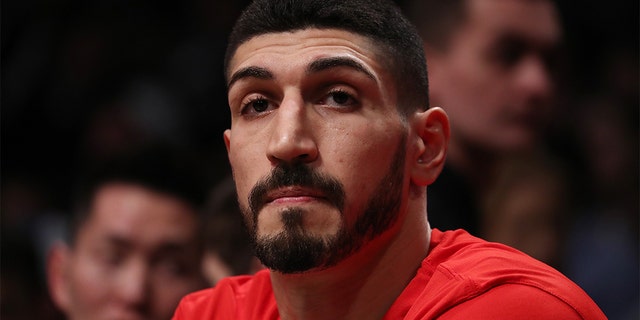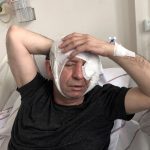Psychiatry professor Haluk Savas said this week that he was denied a passport having been previously held on house arrest over accusations he has a Gulen affiliation, although charges were later dropped. He said he has nine months to live and is not able to leave the country.
To those loyal to Turkish President Tayyip Recep Erdogan, it is paying the price of being tagged a “terrorist.” But to others, it is a blatant violation of their human rights.
Since the failed coup attempt in July 2016, hundreds of thousands of Turkish citizens have – often unknowingly – had their passports rescinded and have subsequently been barred from leaving the country for undetermined stretches of time, or have been blocked from having passports renewed.
For some facing dire health consequences, the crackdown has proven something of a death sentence.
“The government has canceled the passports of over 210,000 family members for over two years simply because they were related to individuals who had been purged or under investigation. Since 2016, purged individuals have not only lost their jobs, but also their health insurance and pensions, and therefore cannot access healthcare services in Turkey unless someone is willing to cover their medical bills,” Aykan Erdemir, a Senior Fellow at the Foundation for the Defense of Democracies and former member of Turkish Parliament, told Fox News. “By banning them also from travel abroad, the government has condemned them to starvation and denied them healthcare.”
Psychiatry professor Haluk Savas said this week that he was denied a passport having been previously held on house arrest over accusations he has a Gulen affiliation, although charges were later dropped.
Despite the allegations, Savas said he lost his job at the Gaziantep University and was diagnosed with cancer while under house arrest. He claims that he has only nine more months to live, and has been refused permission to travel to Asia or the U.S. to undertake new immunotherapy treatments that may give him a second lease on life.
Yet Savas is seemingly just one of many fighting for what they maintain is their right to life.
“For cancer patients, Erdogan’s policies are akin to a death warrant, and his cruel and unusual punishment resembles the brutal policies of the 1980 military government, which similarly prevented cancer patients from receiving treatment abroad,” Erdemir asserted.
Ahmet Seyithanoglu, a Turkish attorney who is now based in New York, underscored that while the Turkish Ministry of Interior does not provide official data on revoked passports directly, they estimate that almost 300,000 citizens are not able to exit – some in critical health straits.
“Furkan Dizdar, who was a 12-year-old Turkish citizen, got brain cancer. After the coup attempt, his doctors in Izmir, Turkey, told Furkan’s family that his brain tumor is incurable and their son probably will die in a month,” he recalled. “After making some research, the family found that there is a possible cure or treatment in Cuba and they decided to go there for their son. Furkan and his family were not allowed to leave the country because of the State of Emergency and Administrative Restriction on their passports. Unfortunately, Furkan’s disease progressed and he died on February 7, 2017.”
According to Nate Schenkkan, Director of Special Research at human rights think-tank Freedom House, the issue is more widespread than just those accused of coup involvement.
“At least 130,000 people were fired from public service under the state of emergency following the coup attempt. The dismissals included cancelation of passports because public servants had a different type of passport. Spouses who had the same type of passport through their husband or wife also had their passports canceled,” he said. “There is an appeals process for people who were dismissed that continues to work its way through the cases, but it has a very low rate of success – only 7.5 percent of appeals are accepted so far.”
Schenkkan also pointed out that even in those cases where an appeal is accepted, the authorities may not issue a new passport for bureaucratic reasons, as Dr. Haruk Savas asserts in his case.
“Additionally, there are tens of thousands of people who were arrested or placed under investigation following the coup attempt, and those measures often include travel restrictions,” Schenkkan explained.

In this Saturday, July 16, 2016 file photo, Turkish soldiers secure Istanbul’s Taksim square, as supporters of Turkey’s President Recep Tayyip Erdogan protest in Istanbul. (The Associated Press)
President Erdogan blames the coup attempt on exiled U.S-based cleric Fethullah Gulen, who has denied any involvement, and his legion of supporters. Nonetheless, Ankara has remained steadfast in the ensuing years; having initiated a protracted crackdown on everyone from businessmen, journalists, and human rights activists to teachers, professors, and bureaucrats with suspected ties to the “terrorist” operations of Gulen.
Enes Kanter, a 26-year-old NBA player for the Portland Trailblazers who had his passport unceremoniously revoked two years ago and an Interpol red notice request slapped on his file in relation to his Gulen support, told Fox News on Tuesday that passport revocation has become a silencing tool.
“I am a law-abiding citizen both in Turkey and the U.S. I never broke a single law in my life, didn’t even have a parking ticket, but the Turkish government cancels my passport,” he lamented. “It is so pathetic that an authoritarian regime can do whatever they want to silence their critics and opposition. It is shameful that they use this as a weapon to silence you. But I won’t back down from my fight in the path of democracy, uplifting human rights and the freedom of speech.”

Enes Kanter #00 of the Portland Trail Blazers looks on against the Brooklyn Nets during their game at Barclays Center on February 21, 2019, in New York City. (Al Bello/Getty Images)
Yet last summer, the Turkish Ministry of Internal Affairs did offer some reprieve and announced it would be removing restrictions on 155,350 passports that had been invalidated in the botched coup blowback. Yet its estimated tens of thousands are still blacklisted from leaving the country.
The Constitution of the Republic of Turkey stipulates that “everyone has the right to freedom of residence and travel,” although “freedom of travel may be restricted by law for the purpose of investigation and prosecution of an offense.”
However, critics contend that their right to travel is being arbitrarily revoked without legal recourse.
“Those with canceled passports are technically able to seek adequate health treatment within Turkey, however, they face difficulty because, after been fired through government pressure, they have lost health benefits accompanying employment,” added Javier El-Hage, Chief Legal Officer for the Human Rights Foundation. “Moreover, there is a shortage of medical personnel as a result of the purges.”
By Hollie Mackay
Source: Fox News



